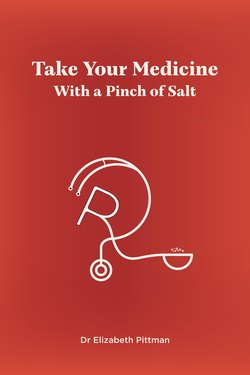Take Your Medicine with a Pinch of Salt

Реклама. ООО «ЛитРес», ИНН: 7719571260.
Оглавление
Elizabeth Pittman. Take Your Medicine with a Pinch of Salt
Introduction
Herbal Medicine
Self-Administered Medicines
Advertised Medicines
Presumptive Medicine
Learned Medicine
Heroic Medicine
Quack Medicine
Diagnostic Medicine
Alternative Medicine
Therapeutic Medicines
Preventative Medicine
Precision Medicine
Our Medicine
Acknowledgements
Отрывок из книги
It is easy, with the scientific arrogance of the twenty-first century, to forget that a century and a half ago most medicines were herbal remedies. The use of plants has a very long history indeed. We know that self-medication with the green pharmacy took place at least as long as 60,000 years ago. In a cave in Iraq, the grave of a Neanderthal man was found to contain many grains of pollen scattered about his body. Using modern scientific methods, the pollen was identified as coming from eight different species of flowering plants found today in the surrounding countryside. Most of these are still used as medicines by local people. One example is the shrub Ephedra, a remedy for asthma and a cardiac stimulant—a usage confirmed by modern science when the nerve stimulant ephedrine was extracted from it.[i]
Throughout the millennia ordinary people have sought remedies where they could, and plants offered an ever-ready supply to try, but were limited to the offerings of the local terrain and mediated by the seasons. We know very little about the early use of herbs since recipes were handed down orally through the wise men and women in peasant communities, however written records began to appear on tablets and stones as long ago as about 5,000 years. The stone tablets of the Sumerians (Southern Mesopotamia) include lists of useful herbal remedies. The public records of King Hammurabi of Babylon (1,754 BCE) were also written on stone and refer to healing plants. There is no doubt that herbs were and remain the principal medicine in India; as the world’s largest producer of medical herbs the subcontinent has been called the ‘botanical garden of the world’. The World Health Organisation has listed 2,500 species of medicinal plants of which 150 species are used on a large scale. Herbal medicine is also widely used in China. A Chinese researcher, Tu Youyou, has extracted artemisinin, the active ingredient of a plant that had been used to treat malaria for over 2,000 years. For this contribution to modern medicine Dr Tu shared the 2015 Nobel Prize for medicine.[ii]
.....
Plaister Two shillings and sixpence
Second round:
.....